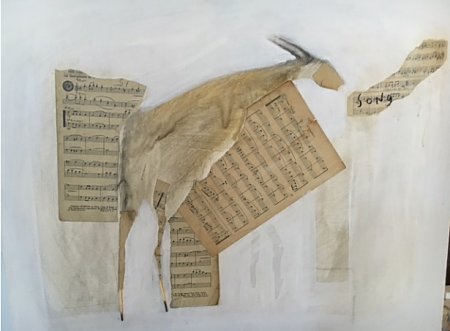
Receptions With the Poet
The perfect opportunity for a reunion presented itself a few months later. Theodore Howland was going to be honored at the New York Historical Society. He had served as America’s Poet Laureate, and several well-known poets were going to read his poems. The reason that Mr. Howland was not going to read his own poems was that he had had a stroke. Lynn and I made a date to go to the ceremony with her daughter, who was a fan of Theodore Howland.
Something came up that prevented Lynn and her daughter from going with me, however, so I drove from Boston and went to the ceremony by myself. The auditorium was full. Who were all these people? How did they all know Mr. Howland? On the stage were several men sitting in chairs near a podium. From the wings came a crippled old man being guided by a younger man, and I burst into tears and couldn’t stop, even though I bit the insides of my cheeks. I was glad my friend and her daughter were not with me, because I was overcome seeing my giant so shrunken. He shuffled behind a walker, his head tipped too much to the side, and was guided into a chair to the sound of thunderous applause from the hundreds of people who had leapt to their feet. He smiled at us from a twisted mouth and made a horrible gesture that was supposed to be a wave of greeting.
Each speaker read poems from Mr. Howland’s several volumes and reminisced about their friendship. Several were former students, men with gray hair, who expressed their gratitude to him. How had they managed to stay friends with Mr. Howland over the years? Could I have stayed friends with him? I would have at least known that he’d had a stroke before reading about it in the alumni magazine. Instead, I knew almost nothing about Theodore Howland. All these people praised him for being a great teacher. Was he different with male students?
At the end of the tributes, Mr. Howland was helped to the podium, and there he attempted to talk to us. What came out, however, was just grunts, so we sat frozen until his companion started clapping, and we all clapped as if we’d understood what he said, and I was crying so hard that cheek biting didn’t help.
Some of the people in the audience formed a crowd waiting to go backstage. My heart was racing because I didn’t know what I’d say to Mr. Howland or even if he would remember me. I would extend my hand, tell him my name, say I was happy to see him again, and make room for the next person. I could do this, I said to myself. Makes no sense to travel all the way from Boston and not let Mr. Howland know I was there to see him honored. But when it came my turn, I was so overcome with sadness that I couldn’t say one word but just stood there as Mr. Howland continued to twist his head this way and that in response to the shouts of greeting coming from various places in the room. I was helpless. A dignified man who was Mr. Howland’s helper came close to me and whispered, “Please come to the reception. There are shuttle buses outside. Just get into any one.” Then he added, “It’ll be okay. No, no wait. Here. Take this,” and he fished a ticket out of his pocket and handed it to me, “just in case.”
As luck would have it, I climbed into the van containing a witty man. From the minute my bottom touched down on the seat next to him and we agreed that we were lucky to be going to this reception, it was as if the sun had broken out. Together, we piled up our plates from the buffet in the cavernous ballroom of one of New York’s ritzy prep schools; together we sat at one of the dozens of tables in a wood-beamed room and had a lively time. He said if he ever wrote his autobiography it would be called Everything Should Have Been Different, or else Enter Complaining. I felt sprung from household cares, from the tedium of domestic life. At this reception I was not someone’s mother, someone’s neighbor, someone’s wife, but a writer among writers. Here I was in New York, the hub of everything, and I must surely belong because the man who was making me laugh was a reporter from The New York Times, and he could have been sitting with anyone but chose to enjoy himself with me. But it did come to an end after the desserts. My new friend and I hugged goodbye. Then I went searching for Mr. Howland.
He was sitting alone at a table. “Hello, Mr. Howland,” I said and sat down next to him. I told him my name. He just sat there, the muscles of his face too loose. I told him I was a student from the days when he had had that apricot poodle and that I was sorry to hear the dog had died. I hadn’t planned what to say, and now I wished that I had because I was talking nonsense and there was no one to rescue me. Mr. Howland’s helper was across the room chatting with other people. I fell silent. Suddenly, Mr. Howland put his hand and on mine and said, “For … a … long … time … I … couldn’t … talk.” Then we just sat there holding hands. We sat like that, just loving each other.
